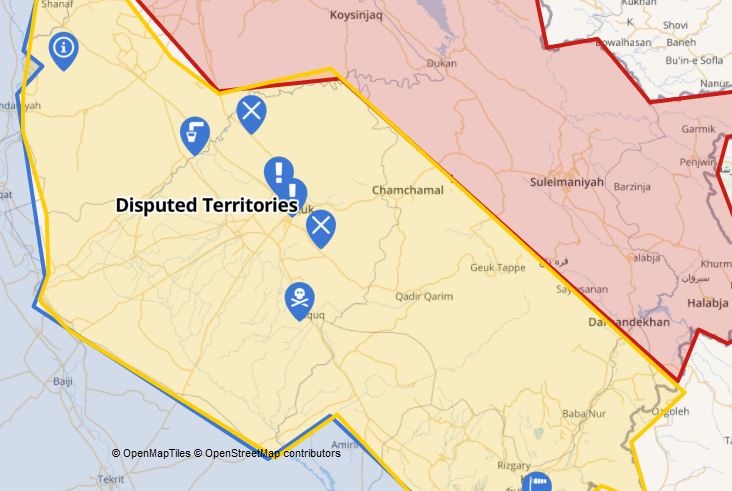1.4K
Kirkuk
- On May 31st, in a politically driven ruling, the Criminal Court sentenced former Kirkuk Provincial Council Chairman, Rebwar Talabani to six years in prison on a criminal complaint of the prosecutor general. Rebwar Talabani has been charged under Article 340 of the Iraqi Penal Code, which deals with deliberate damage to public property. Talabani’s trial was held in absentia. Talabani said he had not received the sentences officially and that the trials were politically motivated. Talabani was forcibly displaced by the Iraqi government on October 16th, 2017, after he participated in the Independence Referendum held by the Kurds in September of 2017. Currently, Talabani is an advisor to the Kurdistan Regional Government’s (KRG) Prime Minister, Massrour Barzani.
- On May 31st, tensions arose between the Iraqi army and the Peshmerga forces after two off-duty Peshmergas were arrested at a checkpoint near Laylan subdistrict. A Peshmerga regiment opened warning fire near the checkpoint. The Iraqi troops released the Peshmerga after talks between commanders on both sides. Separately, the Iraqi army attacked Kurdish protesters blocking the road between Erbil and Kirkuk near Pirde (Alton Kopri) district. The protests sparked by residents of several villages of the Shwan subdistrict demonstrated against the deterioration of primary services, mainly electricity and water. The protestors were furious with the deteriorating living standards as they now receive less than one hour of electricity per day. Likewise, dozens of Kaka’i Kurds protested the demolition of 700 of their homes in the Hay Askari neighborhood, continuing the Ba’ath era Arabization policy which has ramped up since October 16, 2017.
- On May 25th, a high-level security delegation arrived in Kirkuk 48 hours after ISIS (Da’esh) attacked two Shiite Turkmen villages in the Taza subdistrict and killed several farmers. The security delegation was led by Brigadier Ruken Abdul Amir Shamari, deputy commander of Iraqi operations. According to reports, Shamari ordered the deployment of more forces in the southern and southwestern areas towards the Hawija and Daquq districts. On May 26th, Da’esh terrorists claimed responsibility for arsons that targeted Kurdish farms in the recent weeks in Daquq and Khanaqin. Meanwhile, using the pretext of Da’esh attacks, the Iranian-backed militias, “North Axis Operations Command,” announced deploying more militants in Kirkuk.
- On May 29th, police arrested a drug dealer while transporting narcotic pills hidden inside children’s toys. According to police, the suspect was arrested during an ambush by security forces at the Perde checkpoint. The suspect is a resident of Baghdad and had tried to smuggle drugs from Erbil to Kirkuk.
- According to the Iraqi Oil Marketing Company (SOMO), the revenue from Kirkuk oil exports in May was $369,461,916. Crude exports via the Cihan Pipeline reached 3,002,133 barrels earning $335,038,042 US dollars, averaging 111.6 per barrel. Meanwhile, 353,973 barrels were sold to Jordan, earning $34,423,874 at $97.25 per barrel.
Khanaqin
- On May 29th, unknown gunmen attempted to assassinate a Kurdish officer named Saman Kaka’i, director of the third branch of Diyala’s customs in Khanaqin. Kaka’i survived, but no group claimed the assassination attempt. Moreover, the Iraqi General, Ali Fazil, head of Diyala’s Operation Command, met with Peshmerga forces near Kalar, requesting “further coordination” to control the security near Khanaqin. On October 17th, 2017, Fazil prevented the director of Kirkuk’s police from holding a press conference in Kurdish.
Makhmour
- Three months have passed since the Iraqi army’s siege of the Qara Chokh mountain without signs of any military operations carried out. The area has been the de facto headquarters for Da’esh terrorists since 2017. Meanwhile, on May 27th, Da’esh terrorists kidnapped two shepherds near Raian village. The terror group has been generating wealth by abducting locals, mainly in ruler areas, and releasing them on a ransome.
Shingal
- On May 27th, the head of the European Parliament Subcommittee on Security and Defence, Nathalie Loisea, said they are ready to provide significant assistance for the normalization of the situation in Sinjar and the return of the displaced. Her remarks came during a visit to the Kurdistan Region and holding a press conference in the parliament. Shingal remains calm for the third week after recent clashes between the Iraqi army and the Shingal Resistance Units (YBS). However, after reaching an agreement to seize fire and release detainees, five members of the YBS remain in the custody of the Iraqi forces. The clashes resulted in the displacement of 10,000 Yazidis.

